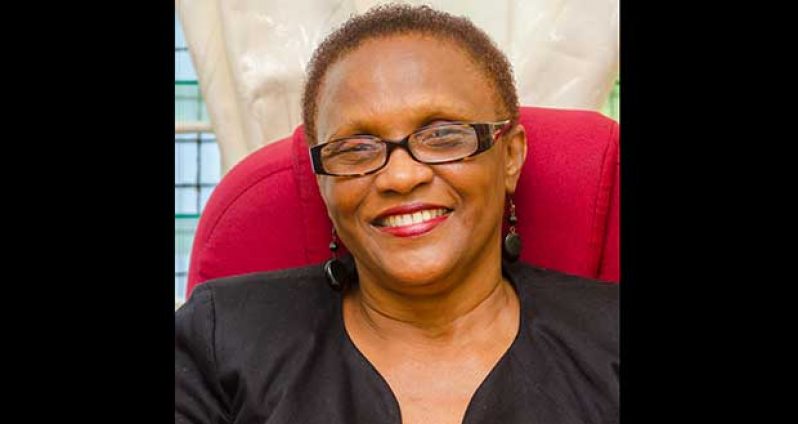– stresses need for ‘practical application’ in teaching
by Telesha Ramnarine
ACTING Director of the Institute of Distance and Continuing Education (IDC), University of Guyana (UG), Mrs. Winifred James Kippins, feels strongly that a good teacher will by all means teach students in a way that will help them reflect on their own lives and see the practical application of the concepts being taught. The 59-year-old, who has always placed a high value on obtaining a sound education for as far back as she can remember, will not settle for less than her PhD, for which she has already signed up.
Born and raised in a humble East Ruimveldt family, Mrs. Kippins always knew that she wanted to become a teacher, and even when circumstances became rough and almost forced her out of an education, she persevered and fought the odds to remain in school.
She attended Salem/Lodge Congregational School and East Ruimveldt Secondary where an older sister (now deceased) paid for her to write six GCE O’ Level subjects. After passing all of them, she immediately realized her dream of becoming a teacher at Campbellville Community High School where she taught Home Economics.
Eventually she would attend the reputable Lilian Dewar College of Education for secondary teachers, which was located in the building that now houses the National Centre for Educational Resource Development (NCERD) in Kingston.
“Lilian Dewar ranked higher than CPCE (Cyril Potter College of Education). I don’t know what they did at Cyril Potter but at Lilian Dewar, we were given everything – books, crayons, markers, text books, everything you can think of that you needed to be a teacher,” Mrs. Kippins said in an interview with the Chronicle at her IDC office in Queen’s College Compound recently.
Having graduated from Lilian Dewar, she went back to teaching at East Ruimveldt Secondary where she was shortly after made the head of department. After five years, she was transferred to the Carnegie School of Home Economics as the supernumerary head of department.
Mrs. Kippins later went to the University of Guyana where she pursued a Bachelor’s Degree in Education and graduated with credit, after which she did post-graduate studies in international studies.
In a turn of events, however, she would decide to stay at home and sew for a living even after graduating from UG. This is not to say that she was regretful of this decision, for sewing turned out to be a very lucrative job for Mrs. Kippins and she began sewing for bank managers, high-ranking professionals and the like.
In 1997, when the SIMAP Programme was introduced for out of school youths though, she decided to go back to Carnegie to teach that programme in garment construction.
From then to now, she has been involved in “extension education,” which refers to evening classes for adults. “What I found is that a lot of the nice, fancy women who came to Carnegie could not measure, could not do basic calculations.
“For instance, they would measure their hips but could not find a quarter of it when asked to. So I realised that there was a crisis. You saw young women who could not do basic measurements. You were wondering what will happen to their lives,” related Mrs. Kippins.
When that programme was coming to an end, she noticed an advertisement for teachers needed in Botswana. She subsequently went to that country and taught for four years, during which she did her Master’s Degree and specialized in adult education.
Teaching and Relevance
Mrs. Kippins has been observing for many years that some teachers teach students in a rather abstract manner. “They are not relating what they are teaching to real life. You will have persons who will need to be able to relate what you’re teaching to their normal experiences, which we will call relevance.
“And in understanding the relevance, it will enable them to better understand what you are teaching them so that they can learn from it.”
Aside from managing IDC, Mrs. Kippins also teaches supervisory management for supervisors and managers of various companies. And she finds that this type of teaching is quite different from that of teaching younger people.
“Adult education is more than what people think. And so sometimes we teach and people cannot relate. Teaching of adults is different to teaching younger people. Adults come to classes with experiences. Often times we teach people and people only pass an exam and after then they cannot relate to any other thing.”
To address this issue, Mrs. Kippins said while at IDC, she has developed some of her own courses including “train the trainers” and the “psychology of adult learning.”
“In every regard, there is one problem: If you cannot teach them in a way to reflect on their own lives, it is difficult for them to understand the concepts.”
Not that she thinks she knows it all, but Mrs. Kippins has a passion for helping people to grow academically. “And so this passion just developed and keeps developing. I like seeing people move from point A to point B. I am always helpful and supportive.”
However, this does not stop her from being the plain-spoken and frank individuals that she is. “I don’t know how to be deceitful, and not everyone can really accept when you are frank and open. But it is not a sign of disrespect in my view. I think it’s letting people understand who you are and what are some of the things that will promote a better relationship. I have a strong personality and a strong determination to get what I want, not to the extent that I have to mash anybody. I have a lot of impatience with incompetence and stupid talk. It annoys me. I don’t have that kind of tolerance.”
Mrs. Kippins is married to Mr. Godfrey Kippins and her children are Mandisa and Ian.


.jpg)











